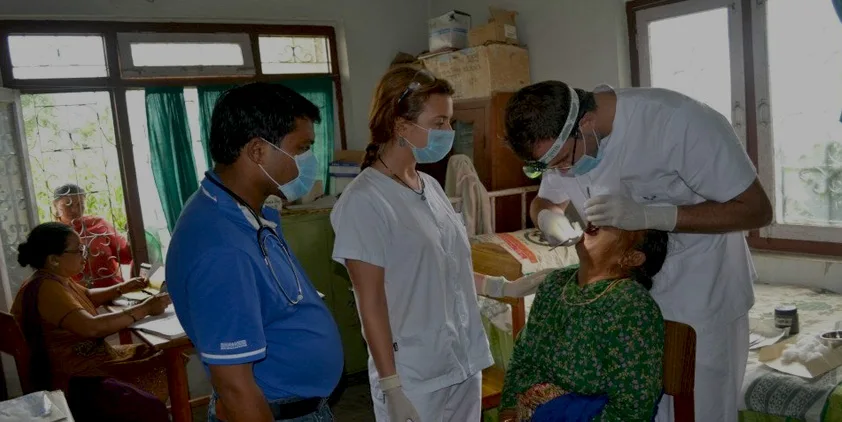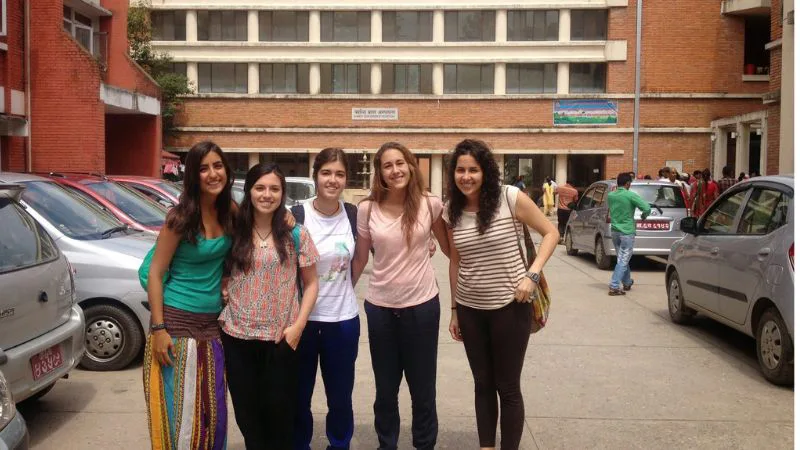Thamel, Kathmandu,Nepal.



Ultimate Adventure & Experience: Medical Elective and Everest Base Camp Trek
Imagine spending one month gaining hands-on medical experience in a state-of-the-art hospital in Kathmandu, followed by a thrilling two-week trek to Everest Base Camp. This unique program is crafted for medical students, healthcare professionals, and adventurers who wish to enhance their medical skills while experiencing Nepal’s stunning landscapes and vibrant culture. This journey offers a perfect blend of professional growth, cultural immersion, and outdoor adventure.
Part 1: 1-Month Medical Elective Placement in Kathmandu
Your adventure begins with a one-month medical elective placement in one of Kathmandu’s leading hospitals. This hospital is well-equipped, boasting thousands of beds, multiple departments, and a bustling outpatient department that caters to a diverse population. This placement is ideal for gaining experience in a highly active, resourceful medical setting, with the flexibility to focus on the areas that match your academic or career goals.

-
Diverse Placement Opportunities:
- Hospital Facilities: The hospital in Kathmandu is well-equipped, offering a range of departments to meet students’ varied needs and interests, including general medicine, surgery, pediatrics, gynecology, and emergency care.
- Tailored Placement: Based on your requirements, you can choose placements in specific departments to focus on particular skills or areas of interest, with access to senior professionals and mentors.
- Rural Clinic Experience: For those interested in rural healthcare, short-term placements in rural clinics can be arranged, allowing you to experience the unique challenges and opportunities of healthcare in remote Nepalese villages.
-
Patient Care and Skill Development:
- Clinical Exposure: Shadow doctors, assist in patient care, observe surgeries, and engage with cases unique to Nepal. This immersive experience offers exposure to different diseases and conditions rarely seen elsewhere.
- Outpatient Department (OPD): Working in the OPD allows you to interact with a large number of patients daily, gaining skills in history-taking, diagnostic processes, and basic patient management.
- Advanced Equipment Access: The hospital provides access to diagnostic tools, labs, and other advanced medical equipment, ensuring a comprehensive learning experience in a well-resourced setting.
-
Optional Rural Clinic Rotation:
If you’re drawn to understanding the healthcare challenges in rural areas, you’ll have the chance to spend a few days in a remote clinic. This rotation provides valuable insights into the disparities in healthcare access, as well as unique clinical experiences that build adaptability and resilience.
-
Cultural and Ethical Considerations:
- Communication and Language Skills: Basic Nepali phrases can enhance your interactions with patients and staff, helping to establish rapport and build trust.
- Ethics and Sensitivity: Healthcare practices in Nepal may differ from your home country’s norms, so open-mindedness and respect for local customs are key. Understanding cultural sensitivities will enrich your experience and ensure respectful, effective patient care.
Part 2: The 2-Week Everest Base Camp Trek
After completing your medical placement, you’ll set out on an exhilarating two-week trek to Everest Base Camp. This part of the program shifts from medical immersion to physical endurance, taking you through the world’s tallest mountain range and some of Nepal’s most scenic landscapes.
-
Trek Highlights:
- Starting Point: Fly to Lukla, a unique mountain airport and the gateway to the Everest region.
- Route: The classic Everest trail leads through charming Sherpa villages, pine forests, and rhododendron-covered hills, offering glimpses of Himalayan giants along the way.
Key Stops Along the Way:
- Namche Bazaar: A vibrant trading town known as the Sherpa capital, it’s an essential stop for acclimatization and a cultural immersion into Sherpa life.
- Tengboche Monastery: A sacred spot for Buddhists with breathtaking views of Everest, the monastery offers an introduction to the spiritual side of the Himalayas.
- Kala Patthar: This viewpoint, the highest on the trek, offers panoramic views of Everest and other towering peaks.
- Everest Base Camp: Located at an elevation of 5,364 meters, this is the goal for most trekkers and the base for climbers summiting Everest. Reaching Base Camp is a physically demanding yet immensely rewarding experience.
-
Physical and Mental Preparation:
- The trek to Everest Base Camp demands a good level of fitness, as you’ll be hiking 4-8 hours each day at high altitudes. Proper acclimatization is essential to prevent altitude sickness, and mental resilience is just as important as physical strength.
- Essential Gear: Pack warm, layered clothing, reliable trekking boots, and other necessities to face the chilly Himalayan climate and rugged terrain.
-
Cultural Immersion Along the Trail:
- The trek allows you to experience the warmth and hospitality of the Sherpa people, renowned for their mountaineering expertise and deep-rooted Buddhist beliefs. Visiting monasteries and observing traditional ceremonies provides insights into the spiritual connection of the Sherpa community with the mountains.
Benefits of This Combined Program
- Professional and Clinical Growth: Gain hands-on medical experience in a well-equipped hospital, with the opportunity to practice in both urban and rural settings. This exposure to diverse healthcare needs and medical cases will deepen your clinical understanding and enhance adaptability.
- Physical and Mental Challenge: The trek to Everest Base Camp challenges both body and mind, pushing you to new levels of endurance and mental fortitude, with the reward of unforgettable Himalayan vistas.
- Meaningful Cultural Experience: Both the placement and the trek allow for deep cultural immersion, from experiencing daily hospital life in Kathmandu to connecting with local communities on the trekking trail.
- Unique Travel Adventure: Blending professional development with the thrill of adventure, this program offers an exceptional travel experience that leaves you with memories, skills, and friendships to last a lifetime.

Essential Preparations
- Medical Knowledge: Familiarize yourself with the common health issues in Nepal, such as respiratory conditions, waterborne diseases, and altitude-related illnesses. This knowledge will help you adapt to the local health context more efficiently.
- Trekking Fitness and Acclimatization: Prepare for the physical demands of the trek with regular cardio, strength training, and possibly altitude training if available.
- Language and Cultural Readiness: Learning basic Nepali phrases and understanding local customs will make your interactions smoother and enhance your appreciation of the culture.
- Health and Safety Precautions: Ensure that you have travel insurance covering both medical placements and high-altitude trekking. Bring any essential medications, as well as a first-aid kit and altitude sickness tablets if necessary.
Why Choose Nepal for a Medical Placement?
Nepal is a developing country with a unique healthcare environment that provides rich learning experiences. Medical placements here offer exposure to a range of health issues not commonly seen elsewhere, such as endemic diseases, altitude sickness, and resource-limited care scenarios. The health system in Nepal also spans public, private, and community levels, giving interns and volunteers a well-rounded view of healthcare delivery across different settings.
Additionally, Nepal’s vibrant culture and diverse communities create a unique learning backdrop. For medical students and healthcare professionals, working in Nepal can enhance cultural competence, adaptability, and problem-solving skills, which are highly valued in global health contexts.
Why Do This Program Through Hands for Help Nepal?
Hands for Help Nepal brings more than 25 years of experience in mobilizing volunteer and internship programs across Nepal. With long-standing connections to hospitals at the private, public, and community levels, they offer well-established placements tailored to participants’ interests. This organization’s experience ensures that each placement is carefully managed, aligning participants’ learning goals with the needs of the host institutions.
Moreover, Hands for Help Nepal is known for its trekking expertise. They have professional guides and experienced staff who have been leading treks for volunteers and interns since 1995, making them a reliable and knowledgeable partner in arranging both your medical placement and adventure activities like trekking.
FAQs
-
Why Everest Base Camp (EBC) Trekking?
The Everest Base Camp Trek is one of the most iconic trekking routes in the world. It offers breathtaking views of the Himalayas, an immersive experience in Sherpa culture, and the thrill of being close to the world’s highest peak. The trek takes about 12-14 days and brings trekkers through stunning landscapes, historic villages, and Buddhist monasteries, making it an unforgettable journey both physically and spiritually.
Alternative Trekking Options:
If you’re interested in other trekking experiences, Nepal has many options:
- Annapurna Circuit: Known for diverse landscapes and varying elevations, this trek offers a blend of lush green hills, desert plateaus, and views of Annapurna, Dhaulagiri, and Machapuchare mountains.
- Langtang Valley Trek: This trek is shorter but offers beautiful alpine scenery, views of Langtang Lirung, and insights into Tamang culture
What type of clinical settings will I experience in Nepal?
Participants can expect placements in general hospitals, specialized clinics, and rural health centers, depending on interests and availability. Hands for Help Nepal arranges placements in departments like emergency care, general medicine, surgery, pediatrics, and maternal health.
-
Do I need prior trekking experience for the EBC trek?
While prior trekking experience can be helpful, it’s not mandatory. Physical fitness and a willingness to train are key. Hands for Help Nepal’s professional guides support trekkers at every step, and the trek is paced to allow for acclimatization.
-
Is knowledge of the Nepali language required for medical placement?
No, Nepali language skills are not required, although learning basic phrases can enhance your experience. Many medical staff in urban areas speak English, and translators or English-speaking supervisors are typically available to assist.
How does Hands for Help Nepal ensure safety on the trek and in medical placements?
The organization prioritizes safety through risk management, experienced guides, acclimatization planning, and clear communication with hospitals and clinics. Emergency procedures are in place for both medical placements and trekking routes.
Conclusion
This program is designed for individuals eager to push their boundaries and gain both medical and trekking experience in one life-changing journey. The 1-Month Medical Elective Placement provides a rare opportunity to develop skills in a robust healthcare environment, while the 2-Week Everest Base Camp Trek takes you to one of the most awe-inspiring places on Earth. This is an adventure that goes beyond tourism—it’s an experience of personal growth, professional enrichment, and cultural understanding that will stay with you long after you leave Nepal.
Prepare yourself for a journey of a lifetime, where every step, every patient encounter, and every breathtaking view will shape your perspective and deepen your connection with the world around you.
This program through Hands for Help Nepal offers a comprehensive and deeply engaging experience, blending hands-on medical learning with the adventure of trekking in the Himalayas.
